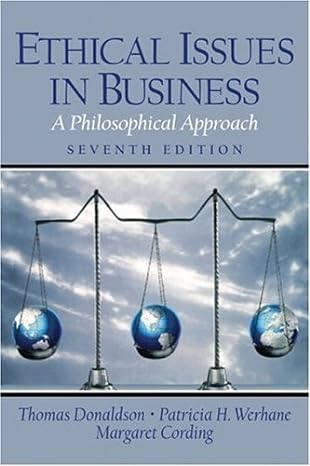Answered step by step
Verified Expert Solution
Question
1 Approved Answer
O'Connor Construction Charged with Corruption Charges Pending O'Connor Construction is a famay-owned and operated Irish company that has been headquartered in Dublin for fifteen years.
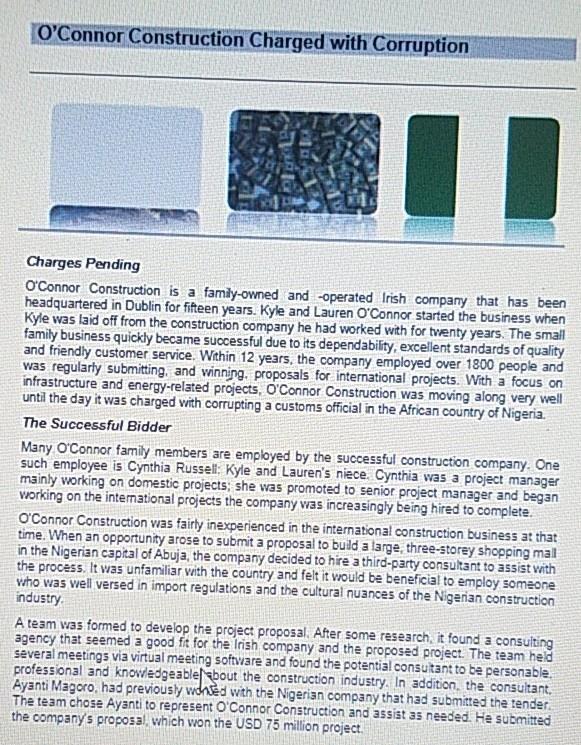
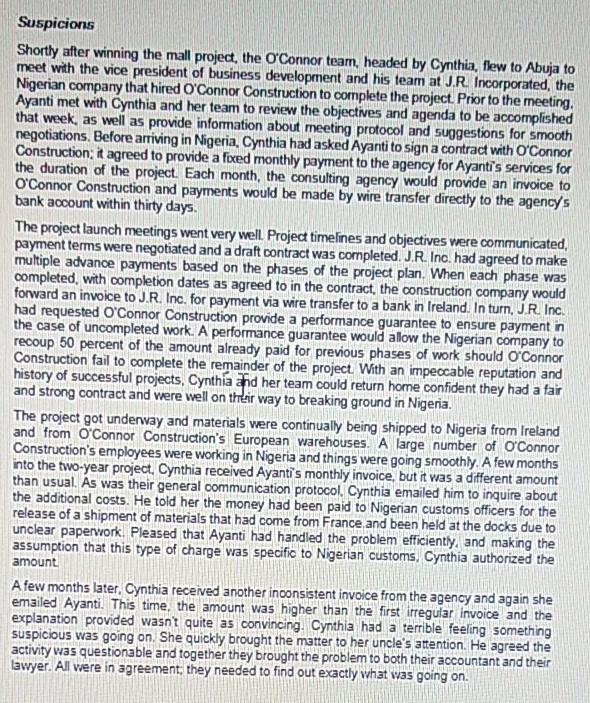
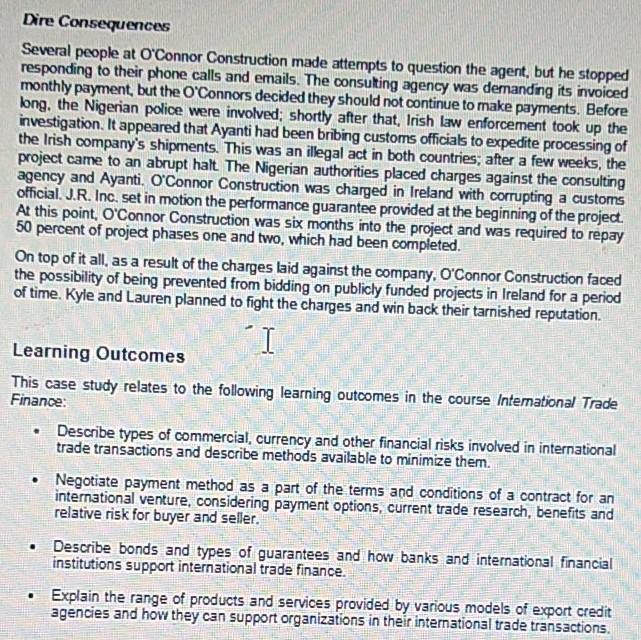
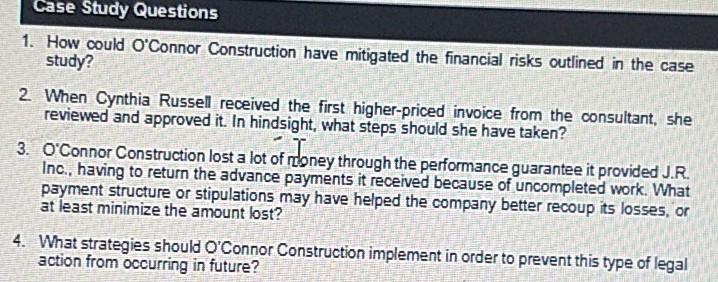
O'Connor Construction Charged with Corruption Charges Pending O'Connor Construction is a famay-owned and operated Irish company that has been headquartered in Dublin for fifteen years. Kyle and Lauren O'Connor started the business when Kyle was laid off from the construction company he had worked with for twenty years. The small family business quickly became successful due to its dependability, excellent standards of quality and friendly customer service. Within 12 years, the company employed over 1800 people and was regularly submitting, and winning proposals for international projects. With a focus on infrastructure and energy-related projects, O'Connor Construction was moving along very well until the day it was charged with corrupting a customs official in the African country of Nigeria. The Successful Bidder Many O'Connor family members are employed by the successful construction company. One such employee is Cynthia Russell: Kyle and Lauren's niece. Cynthia was a project manager mainly working on domestic projects, she was promoted to senior project manager and began working on the intemational projects the company was increasingly being hired to complete. O'Connor Construction was fairly inexperienced in the international construction business at that time. When an opportunity arose to submit a proposal to build a large, three-storey shopping mal in the Nigerian capital of Abuja, the company decided to hire a third-party consultant to assist with the process. It was unfamiliar with the country and felt it would be beneficial to employ someone who was well versed in import regulations and the cultural nuances of the Nigenan construction industry A team was formed to develop the project proposal. After some research it found a consulting agency that seemed a good fit for the Irish company and the proposed project. The team held several meetings via virtual meeting software and found the potential consu tant to be personable. professional and knowledgeable about the construction industry. In addition, the consultant Ayanti Magoro, had previously wched with the Nigerian company that had submitted the tender The team chose Ayanti to represent O'Connor Construction and assist as needed. He submitted the company's proposal which won the USD 75 million project Suspicions Shortly after winning the mall project, the OConnor tearn, headed by Cynthia, flew to Abuja to meet with the vice president of business development and his team at J.R. Incorporated, the Nigerian company that hired O'Connor Construction to complete the project. Prior to the meeting. Ayanti met with Cynthia and her team to review the objectives and agenda to be accomplished that week, as well as provide information about meeting protocol and suggestions for smooth negotiations. Before arriving in Nigeria, Cynthia had asked Ayanti to sign a contract with O'Connor Construction, it agreed to provide a fixed monthly payment to the agency for Ayanti's services for the duration of the project. Each month, the consulting agency would provide an invoice to O'Connor Construction and payments would be made by wire transfer directly to the agency's bank account within thirty days. The project launch meetings went very well. Project timelines and objectives were communicated, payment terms were negotiated and a draft contract was completed. J.R. Inc. had agreed to make multiple advance payments based on the phases of the project plan. When each phase was completed, with completion dates as agreed to in the contract, the construction company would forward an invoice to J.R. Inc. for payment via wire transfer to a bank in Ireland. In turn, JR Inc. had requested O'Connor Construction provide a performance guarantee to ensure payment in the case of uncompleted work. A performance guarantee would alow the Nigerian company to recoup 50 percent of the amount already paid for previous phases of work should O'Connor Construction fail to complete the remainder of the project . With an impeccable reputation and history of successful projects, Cynthia and her team could return home confident they had a fair and strong contract and were well on their way to breaking ground in Nigeria. The project got underway and materials were continually being shipped to Nigeria from Ireland and from O'Connor Construction's European warehouses. A large number of O'Connor Construction's employees were working in Nigeria and things were going smoothly. A few months into the two-year project, Cynthia received Ayanti's monthly invoice, but it was a different amount than usual. As was their general communication protocol, Cynthia emailed him to inquire about the additional costs. He told her the money had been paid to Nigerian customs officers for the release of a shipment of materials that had come from France and been held at the docks due to unclear paperwork. Pleased that Ayanti had handled the problem efficiently, and making the assumption that this type of charge was specific to Nigerian customs, Cynthia authorized the amount A few months later, Cynthia received another inconsistent invoice from the agency and again she emailed Ayanti. This time, the amount was higher than the first irregular invoice and the explanation provided wasn't quite as convincing. Cynthia had a terrible feeling something suspicious was going on. She quickly brought the matter to her uncle's attention. He agreed the activity was questionable and together they brought the problem to both their accountant and their lawyer. All were in agreement: they needed to find out exactly what was going on. Dire Consequences Several people at O'Connor Construction made attempts to question the agent, but he stopped responding to their phone calls and emails. The consulting agency was demanding its invoiced monthly payment, but the O'Connors decided they should not continue to make payments. Before long. the Nigerian police were involved: shortly after that, Irish law enforcement took up the investigation. It appeared that Ayanti had been bribing customs officials to expedite processing of the Irish company's shipments. This was an illegal act in both countries, after a few weeks, the project came to an abrupt halt. The Nigerian authorities placed charges against the consulting agency and Ayanti. O'Connor Construction was charged in Ireland with corrupting a customs official. J.R. Inc, set in motion the performance guarantee provided at the beginning of the project. At this point, O'Connor Construction was six months into the project and was required to repay 50 percent of project phases one and two, which had been completed. On top of it all, as a result of the charges laid against the company, O'Connor Construction faced the possibility of being prevented from bidding on publicly funded projects in Ireland for a period of time. Kyle and Lauren planned to fight the charges and win back their tarnished reputation I Learning Outcomes This case study relates to the following learning outcomes in the course Interational Trade Finance: Describe types of commercial, currency and other financial risks involved in international trade transactions and describe methods available to minimize them. Negotiate payment method as a part of the terms and conditions of a contract for an international venture, considering payment options, current trade research, benefits and relative risk for buyer and seller. Describe bonds and types of guarantees and how banks and international financial institutions support international trade finance. Explain the range of products and services provided by various models of export credit agencies and how they can support organizations in their international trade transactions, . Case Study Questions 1. How could O'Connor Construction have mitigated the financial risks outlined in the case study? 2. When Cynthia Russel received the first higher-priced invoice from the consultant, she reviewed and approved it. In hindsight, what steps should she have taken? 3. O'Connor Construction lost a lot of money through the performance guarantee it provided J.R. Inc., having to return the advance payments it received because of uncompleted work. What payment structure or stipulations may have helped the company better recoup its losses, or at least minimize the amount lost? 4. What strategies should O'Connor Construction implement in order to prevent this type of legal action from occurring in future
Step by Step Solution
There are 3 Steps involved in it
Step: 1

Get Instant Access to Expert-Tailored Solutions
See step-by-step solutions with expert insights and AI powered tools for academic success
Step: 2

Step: 3

Ace Your Homework with AI
Get the answers you need in no time with our AI-driven, step-by-step assistance
Get Started


